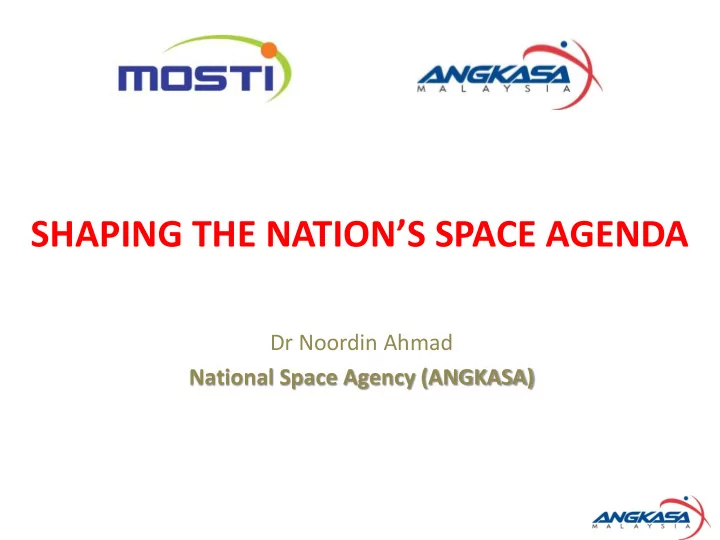

SHAPING THE NATION’S SPACE AGENDA Dr Noordin Ahmad National Space Agency (ANGKASA)
SPACE SECTOR • Like the Internet, space technology has become a critical component of the global information infrastructure – Scalable applications enabling broad new capabilities – Facilitating innovations in efficiency, safety, environmental, public safety/crisis and disaster management, and science • Over the past decade, SPACE TECHNOLOGY/APPLICATION has grown into a global utility providing space-based positioning, global connection and eyes from “heaven” – Consistent, predictable, dependable policy and performance
This first part intend to provide the overall background and the state of space (economic) development and utilization.
CHAL CHALLENGES LENGES TO EST TO ESTABL ABLISHING ISHING A SP A SPACE CE SECTOR IN SECTOR IN MAL ALAYSIA SIA 1. Malaysia is still an industrially developing nation. Space technology is treated as prohibitively untenable domain; disconnected from the apparent grass-root level developmental objectives. Consequently, space technology is hardly explored nor prioritized as a crucial component of the solution to problems confronting the national developmental agenda. 2. Space technology requires huge financial investments, has long gestation periods and is exposed to risk of failure. Whilst Malaysia is characterized by very meagre financial resources and a vast array of developmental needs space technology implementation will have to compete with other deserving needs for these limited funds. 3. At present, Malaysia substantially lacks the necessary knowledge and expertise required to establish and efficiently run a prosperous domestic space sector. It is hence a critical for Malaysia to institute measures that will nurture a competent domestic space technology capacity.
CHAL CH ALLE LENGES NGES TO EST TO ESTABL ABLISH ISHING ING A SPACE A SP CE SECTOR IN SECTOR IN MALA MALAYSIA SIA - cont cont 4. Most countries with established space programs are likely to be reluctant to transfer space technology. Because of the copious investments involved, national security fears and apprehensions about encouraging competition against its own space industry; no country is envisioned to be philanthropic with space technology. Fostering multiple stronger bilateral ties and acquiring strategic diplomatic leverage may help Malaysia mitigate this issue. 5. Malaysia lacks an established domestic hi-tech sector with dual use or that can be easily scaled or converted to space technology application. An existing (and propose) dual use or closely related technological infrastructure would hence bootstrap the proposed space sector onto the desired trajectory.
VISION Space sector as a strategic contributor towards Malaysia’s sovereignty and competitiveness MISSION To develop the country’s potential in the space sector to support the development of the new economy, capture opportunities and manage risk.
MAL MALAYSIA SIA SP SPACE SEC CE SECTOR FO TOR FORMULA RMULATIO TION The definitive road-map that Malaysia needs to follow in order to establish a domestic space sector from scratch will essentially entail ascending the space technology capability hierarchy pyramid.
SURGING SECTORS Security Education and (knowledge Defense generation) Better life (good living) International Relations
MAL MALAYSIA SIA SP SPACE SEC CE SECTOR FO TOR FORMULA RMULATIO TION Phase 1 (2016-2020) Structuring the space sector This phase is primarily tasked with establishing the prerequisite foundational structures upon which the domestic space sector will be established. The obligatory sensitization campaign, political groundwork, legal framework and fiscal rationalization will be conducted during this phase. Activities here are principally focused on creating the requisite enabling environment to commence the formation of the Malaysia space sector. • Establish Malaysia’s space policy to guide the country in defining the space sector objectives. guide the legislature in enacting the relevant legal framework.
MALA MALAYSIA SP SIA SPACE SECTOR FORMU CE SECTOR FORMULA LATION TION Phase 2 (2021-2030) Maturation of the space sector • Further capacity and capability expansion. • Maturation of technical capacity and capabilities. • Full operation of space infrastructure • Setting space based industry • Dual purpose operation • Strategic engagement and collaboration on relevant space technologies so as to build capacity from technology recipient to a technology developer
THANK YOU
Recommend
More recommend